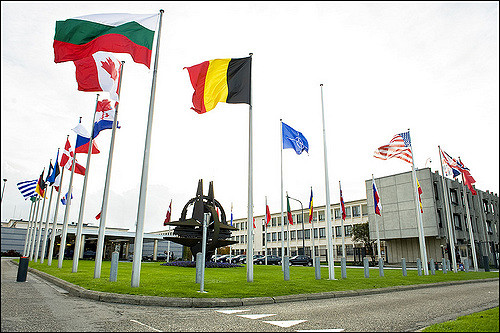Part I of this series offered the following reasons why focusing on women just makes good security sense:
#1:Women’s security is an indicator of state peacefulness
#2: Women are critical for long-term development
Now, Part II will look at three more empirically grounded and utilitarian reasons why focusing on women just makes good security sense.
#3. Sexual violence against women is a common tactic in war
Rape and other forms of sexual violence against women are exceedingly common during conflicts. Such incidents are often viewed as tragic by-products of war when in fact they are usually carried out as part of a deliberate strategy.
[captionpix align=”left” theme=”elegant” width=”475″ imgsrc=”http://natoassociation.ca/wp-content/uploads/2013/08/o-SEXUAL-VIOLENCE-IN-CONFLICT-900.jpg” captiontext=””]
Though it has only recently been categorized as such, rape has been employed as a weapon of war since ancient times; in the 13th century, Genghis Khan inspired terror during his conquests through his policies of rape warfare. Similar tactics continue to this day as they are an effective means of demoralizing not only the victim but also families and entire communities.
In Colombia, rival groups frequently use sexual violence against women and girls as a form of punishment in order to impose their own code of conduct over towns and villages they seek to control. Amnesty International has recently accused pro-government Janjaweed militias in Sudan’s Darfur region of using mass rape to punish, humiliate, and control their opponents.
Rape is also common in ethnic conflict because rape is seen as a way of destroying a rival community. During the 1992-1995 Bosnian War Médecins Sans Frontières reported that systematic rape was employed by Serbs as part of their ethnic cleansing strategy. The perpetrators sought to impregnate women of the other community so they would give birth to Serbian children, effectively re-drawing ethnic boundaries. Conservative estimates suggest that between 20,000 and 50,000 women were raped during the Bosnian War.
In order to understand and prevent conflict, strategy and tactics must be analysed. As such, sexual violence against women must be understood as an integral component to the study of war and conflict.
#4. Domestic violence has a broad economic impact
Violence against women is not exclusive to conflict scenarios. Domestic violence is a global phenomenon that sees one in three women in the world beaten, coerced into sex, or otherwise abused during her lifetime. Not only are high levels of violence against women correlated with increased levels of violence at the state level (as demonstrated by Hudson and her colleagues), but domestic violence is also very costly for states.
Domestic violence and sexual assault cost approximately CAD$4.2 billion per year in Canada and USD$5.8 billion per year in the United States. Costs associated with domestic violence include the costs of healthcare services, social and welfare services, counseling, police and criminal justice services, legal services, and refuge services.
Domestic violence also impacts economic productivity. Reduced earnings and lower productivity are among the prominent indirect costs of domestic violence. Studies show that abused women earn substantially less than non-abused women and they also experience lower rates of employment and job retention. This hinders national economies from reaching their full potential.
It is important to remember that men can also be victims of domestic violence. The fact that there is less data to fully grasp the scope of this issue is certainly a problem. It is therefore possible that the above statistics underestimate the economic impact of domestic violence, providing all the more reason why this issue matters. What does seem clear is that domestic violence in general is costly for states, providing yet another reason why the security of women – and men – is a pragmatic concern for state leaders.
#5. Women’s participation in peace negotiations is necessary for successful post-conflict peacebuilding
A key issue in security studies is how to prevent conflicts from recurring once they have ended. Women have traditionally been kept out of this process, which has proved detrimental to the potential for success. The importance of women’s involvement in post-conflict reconstruction and peace-building processes in general is highlighted in UNSCR 1325. Thus, this resolution is important not necessarily because it endorses any moral impetus for including women in peace negotiations but because it formally acknowledges that without women these negotiations are often fruitless.
[captionpix align=”left” theme=”elegant” width=”300″ imgsrc=”http://natoassociation.ca/wp-content/uploads/2013/08/350px-LiberianWomen.jpg” captiontext=””]
Empirical evidence points to a strong correlation between more inclusive and open models of peace negotiations and the likelihood that the terms of these negotiations will hold. There is also evidence that women’s participation in peace negotiations lead to more gender awareness in agreements which enhances their comprehensiveness and their legitimacy.
Perhaps a reason for this correlation is because men and women have been found to define peace differently. According to a report published by the Institute of Development Studies, women surveyed in Liberia, Nepal, Pakistan, and Sierra Leone had a broad view of peace that included basic rights like education, healthcare, and freedom from violence at home. In contrast, men tended to define peace as merely the absence of armed conflict. As such, it seems reasonable to conclude that women are necessary participants in peace processes because of their familiarity with structural and cultural violence which can lead to state insecurity.
Understanding women’s rights and women’s security is a complex but essential undertaking that is so much more than a moral imperative. Gender inequality and the insecurity of women fundamentally undermine state security, economic prosperity, and the durability of peace negotiations. Those wishing to understand conflict and augment state security cannot afford to lose focus on women.




